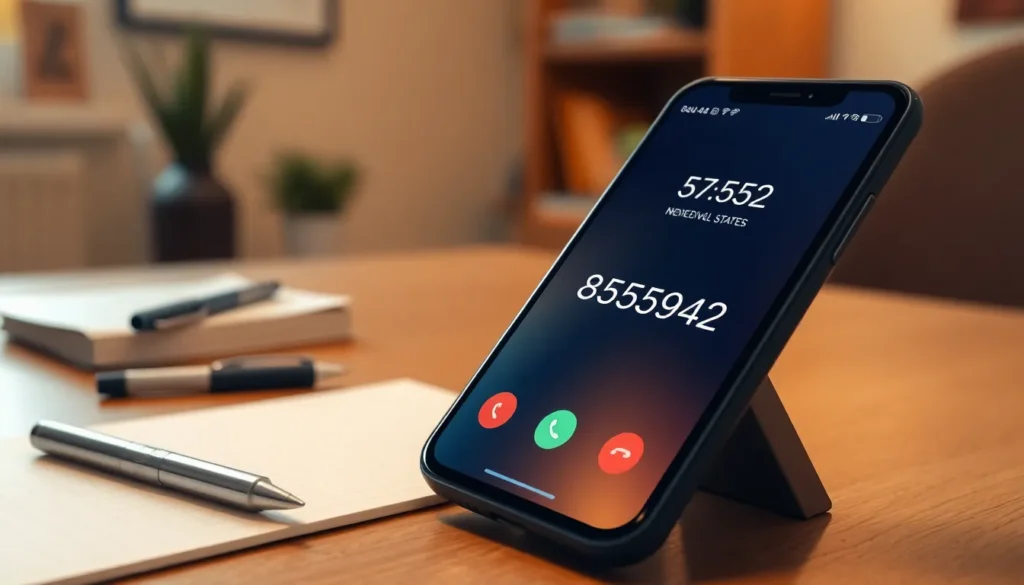Table of Contents
ToggleIn a world where even your cat has its own Instagram account, accountants can’t be left behind. Enter mobile apps designed specifically for the financial wizards who keep the world’s money in check. These handy tools not only streamline tasks but also make accounting feel less like a chore and more like a well-organized game of Tetris.
Overview of Mobile Apps for Accountants
Mobile apps cater to accountants by streamlining essential tasks. These tools facilitate real-time access to financial data, allowing professionals to manage client accounts efficiently. Numerous applications focus on invoicing, expense tracking, and tax preparation. Clients benefit from these apps, as timely updates improve overall communication.
Many mobile apps integrate seamlessly with existing accounting software. This integration enhances data accuracy and reduces the likelihood of errors. Some popular choices include QuickBooks, Xero, and FreshBooks, known for their user-friendly interfaces. They enable accountants to track time, monitor expenses, and generate reports on the go.
Security remains a top priority for these applications. Most utilize encryption and secure authentication methods to protect sensitive financial information. When selecting an app, accountants should evaluate the security features and data backup options offered.
Accountants also appreciate cloud-based solutions. Cloud technology allows for easy collaboration with clients and team members, promoting transparency. Accessibility from multiple devices ensures that accountants stay productive wherever they are.
The landscape of mobile apps continues to evolve. As technology advances, new features and improvements emerge constantly. This evolution makes it essential for accountants to stay informed about the latest tools that enhance their efficiency and effectiveness. By adopting mobile solutions, they can navigate the complexities of their profession while keeping pace with the demands of a digital world.
Key Features to Look For

Mobile apps for accountants must include essential features that enhance productivity and ensure a smooth workflow. Prioritizing these capabilities leads to better performance in accounting tasks.
User-Friendly Interface
User-friendly interfaces promote ease of navigation. Intuitive designs reduce the learning curve for users, allowing accountants to focus on tasks rather than tech issues. Clear buttons and logical layouts encourage quick access to important functions. Mobile applications that utilize straightforward language can communicate effectively without overwhelming users. A responsive design that adapts to different screen sizes enhances usability, making it easier to manage resources on the go.
Security Measures
Security measures protect sensitive financial information. Encryption serves as a primary layer, ensuring data remains confidential during transmission. Regular updates keep applications secure against new threats, while secure authentication methods safeguard unauthorized access. Accountants benefit from multi-factor authentication, providing an additional verification step. Trustworthy applications also comply with industry regulations, which further reinforces data protection and integrity.
Integration Capabilities
Integration capabilities streamline workflows by connecting various tools. Mobile apps that sync with existing accounting software allow for seamless data transfers and reduce manual entry errors. They also enable access to real-time financial information across platforms, enhancing collaboration and transparency. Compatible applications that work with third-party tools simplify processes, making it easier to track expenses and generate reports. Accountants thrive in environments where systems work together efficiently, supporting their overall productivity.
Popular Mobile Apps for Accountants
Mobile apps revolutionize accounting practices by providing essential tools for efficiency and accuracy. Many applications cater to specific needs, simplifying tasks while enhancing productivity.
App 1: QuickBooks Accounting
QuickBooks Accounting stands out for its comprehensive features that allow accountants to manage financial data effortlessly. Users can track income and expenses, generate invoices, and run detailed reports instantly. This app offers integration with other financial tools, promoting seamless data flow. QuickBooks also prioritizes user experience, featuring an intuitive interface that minimizes the learning curve for new users. Security remains a focus, with robust encryption providing protection for sensitive financial information.
App 2: Xero
Xero has gained popularity for its cloud-based capabilities that ensure accountants stay connected with clients in real time. Users appreciate its features, including invoicing, expense management, and bank reconciliation. The app allows for easy collaboration with team members, facilitating effective communication and task management. Xero’s dashboard provides at-a-glance views of financial performance, making oversight straightforward. Security features like two-step authentication safeguard user data, maintaining the integrity of sensitive information.
App 3: FreshBooks
FreshBooks is favored for its ease of use, particularly among freelancers and small business accountants. This app streamlines invoicing with customizable templates, ensuring timely payments. Expense tracking is user-friendly, allowing accountants to snap photos of receipts for easy documentation. FreshBooks includes time tracking features, helping professionals bill clients accurately. Integration with various software enhances functionality, supporting diverse accounting needs. Advanced security measures protect client data, ensuring peace of mind while managing finances.
Benefits of Using Mobile Apps
Mobile apps for accountants provide significant advantages that enhance their workflow and productivity. These tools become indispensable as they adapt to current professional demands.
Enhanced Accessibility
Mobile apps enable accountants to access financial data anytime, anywhere. Whether in the office or on the go, they can view client information and reports from their devices. Many applications offer cloud functionality, ensuring data synchronization across platforms. This flexibility leads to faster decision-making as accountants respond promptly to client needs. They also facilitate easy sharing of documents and updates, fostering communication between accountants and clients. Real-time access to financial information enhances organization and helps maintain accuracy in financial reporting.
Improved Efficiency
Accountants experience improved efficiency through streamlined workflows with mobile apps. Tasks such as invoicing and expense tracking become quicker and more manageable. Automation features, like receipt scanning and report generation, minimize manual entry, reducing the risk of errors. This allows them to focus on higher-level analysis and advisory work rather than routine tasks. Moreover, the integration of various tools enhances workflow connectivity, creating a seamless experience when switching between apps. With organized interfaces, accountants navigate through tasks swiftly, ensuring optimal use of their time.
Challenges in Using Mobile Apps
Mobile apps offer significant advantages, yet they come with challenges that accountants must navigate.
Data Security Concerns
Data security remains a critical issue for accountants using mobile apps. Exposure to cyber threats endangers sensitive financial information stored on these platforms. Many apps employ encryption and secure authentication methods, yet no system is entirely immune to breaches. Accountants need to ensure robust security measures are in place before adopting any app. Understanding the specific security protocols of each application aids in minimizing risks associated with data exposure. Ongoing vigilance is necessary as threat landscapes continue to evolve, making it vital for accountants to prioritize security features.
Limited Offline Functionality
Limited offline functionality presents another challenge when utilizing mobile apps. Many applications require a stable internet connection to access critical features and data. Accountants working in remote areas or during travel may encounter disruptions that hinder productivity. While some apps offer offline capabilities, they often restrict functionality, limiting access to essential tools and information. Therefore, accountants should evaluate the offline features of potential mobile apps to ensure consistent workflow, regardless of connectivity. Recognizing the importance of offline access can enhance overall effectiveness when working away from the office.
Mobile apps are revolutionizing the accounting profession by enhancing efficiency and enabling accountants to adapt to a rapidly changing digital landscape. With tools that simplify invoicing, expense tracking, and client communication, these applications empower professionals to manage their workloads more effectively.
As accountants embrace these innovations, the focus on security and integration becomes paramount. Choosing the right app can lead to improved productivity and better client relationships. By staying informed about emerging technologies and prioritizing robust security measures, accountants can navigate the complexities of their work with confidence and ease. The future of accounting is undoubtedly mobile, and those who leverage these tools will find themselves ahead in the game.




